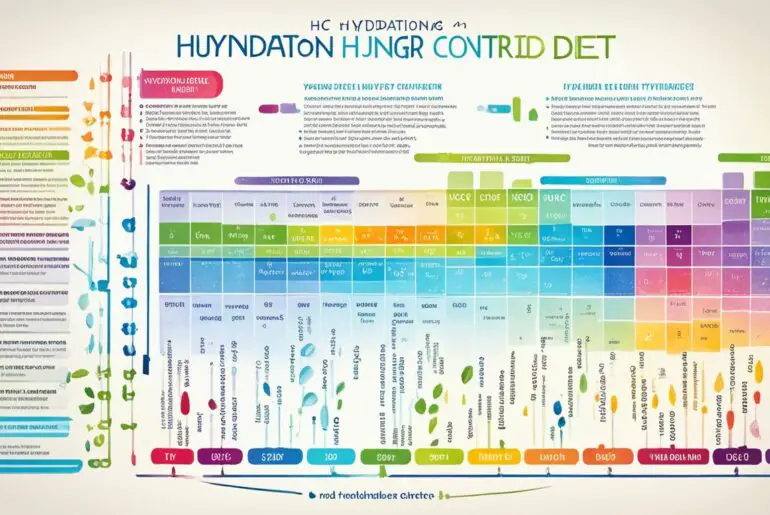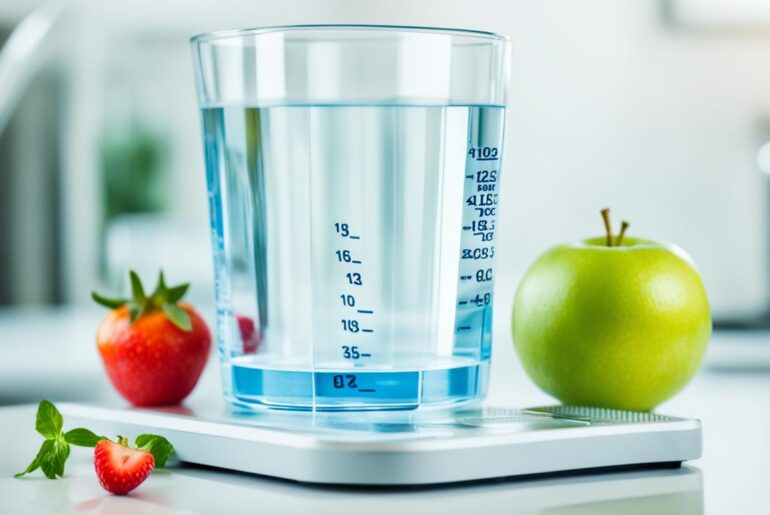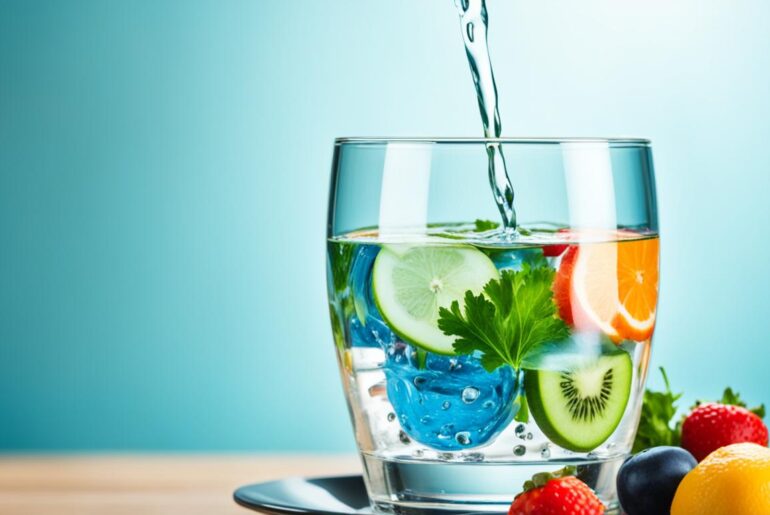Have you ever wondered why some diets come with a reputation for causing water retention? Or maybe you’ve heard about the HCG diet and its incredible weight loss results, but you’re curious about its potential impact on water retention. Well, today we’re diving into the topic of water retention and the HCG diet to help you understand what you need to know.
Water retention, a common issue faced by many individuals, can be influenced by various factors, including diet. The HCG diet, a controversial weight loss program that recommends severe calorie restriction, has gained attention for its rapid weight loss results. However, does this diet have any connection to water retention? And if so, how can it be managed effectively?
Join me as we explore the relationship between water retention and the HCG diet, uncover the dangers associated with this controversial program, and discover practical tips for managing water retention while on this diet. By the end, you’ll have a comprehensive understanding of water retention and the HCG diet, empowering you to make informed decisions about your weight loss journey.
Key Takeaways:
- Water retention can be influenced by diet and may be a concern while on the HCG diet.
- The HCG diet is a controversial program that recommends severe calorie restriction.
- The HCG diet carries various risks and is not considered safe or effective for long-term weight management.
- Practical tips for managing water retention on the HCG diet include monitoring sodium intake, staying hydrated, and avoiding certain foods.
- Seeking professional guidance and exploring sustainable alternatives are important for long-term success and overall health.
Why is the HCG diet popular?
The HCG diet has gained popularity due to its recommendation of severe calorie restriction. This approach is believed to lead to short-term weight loss, which appeals to individuals looking for quick results. The diet limits calorie intake to 500 to 800 calories a day, resulting in rapid weight loss. However, it is vital to understand that this weight loss is not sustainable and can come with potential health risks.
While the HCG diet has generated attention because of its association with rapid weight loss, it is important to note that it is not considered a safe or effective method for long-term weight management. Severe calorie restriction can lead to nutrient deficiencies and electrolyte imbalances, compromising overall health. It is crucial to prioritize balanced nutrition and sustainable approaches to weight loss for long-term success.
Healthcare professionals recommend focusing on a well-rounded eating plan that includes a variety of nutrient-dense foods and appropriate portion sizes. Incorporating regular physical activity, such as moderate exercise and strength training, is also encouraged for optimal health and weight management.
| Benefits of the HCG Diet | Warnings and Considerations |
|---|---|
|
|
It is important to consult with a healthcare professional before starting any diet plan, especially one as restrictive as the HCG diet. They can provide personalized guidance and help tailor an approach that meets individual needs and goals while prioritizing overall health and safety.
The dangers of the HCG diet

The HCG diet carries several risks and dangers. Severe calorie restriction can lead to gallstone formation, irregular heartbeats, nutrient deficiencies, and electrolyte imbalances. The HCG hormone may also promote the growth of certain cancers. Side effects of the HCG diet include fatigue, irritability, depression, fluid buildup, and breast swelling in males. There is also a risk of blood clots forming and blocking blood vessels. It is important to seek safer and more sustainable approaches to weight loss, such as a balanced diet and regular exercise, under the guidance of a healthcare professional.
The severe calorie restriction of the HCG diet can have detrimental effects on the body. By consuming only 500 to 800 calories per day, individuals may experience gallstone formation, which can cause intense pain and may require medical intervention. Irregular heartbeats, known as arrhythmias, can also occur due to the extreme calorie restriction, potentially leading to complications and heart-related health issues.
Additionally, the HCG hormone used in the diet has been associated with the promotion of certain cancers. While further research is needed to fully understand the extent of this risk, it is essential to consider the potential long-term consequences of using HCG for weight loss.
Side effects of the HCG diet can range from mild to severe. Fatigue, irritability, and depression are common symptoms experienced by individuals on this diet. Fluid buildup, also known as edema, can cause swelling in the ankles, hands, and face. In males, the HCG hormone can lead to breast enlargement, a condition called gynecomastia.
One of the most concerning risks associated with the HCG diet is the possibility of blood clots forming and blocking blood vessels. This can lead to serious complications, such as deep vein thrombosis and pulmonary embolism, which can be life-threatening.
Given the potential dangers and health risks of the HCG diet, it is crucial to prioritize safer and more sustainable approaches to weight loss. Consulting with a healthcare professional and following evidence-based guidelines for a balanced diet and regular exercise can help individuals achieve their weight loss goals while safeguarding their health.
Tips for managing water retention on the HCG diet
While on the HCG diet, it is crucial to be mindful of managing water retention. Water retention can lead to bloating and hinder accurate progress tracking. Here are some helpful tips to manage water retention on the HCG diet:
- Monitor Sodium Intake: Excessive sodium can cause water retention. Be mindful of ingredients and choose low-sodium options when planning meals.
- Stay Hydrated: Drinking at least 2 liters of water per day can help flush out excess fluids and reduce water retention.
- Avoid Bloating and Inflammation: Certain foods can contribute to bloating and inflammation. Limit or avoid foods such as processed, fried, and high-sugar items.
- Keep a Food Journal: Tracking your food intake can help identify patterns that may lead to water retention. Note any specific foods that seem to cause bloating or water retention.
- Address Sensitivities or Allergies: Some individuals may be more prone to water retention due to sensitivities or allergies to certain foods. If you suspect this could be the case, consult with a healthcare professional and consider eliminating potential triggers.
If you experience water retention while on the HCG diet, it can be helpful to focus on measuring your progress in inches rather than solely relying on weight measurements. Water retention can skew weight numbers, but measuring specific body areas will give you a more accurate representation of progress.
By implementing these tips and being mindful of managing water retention, you can optimize your journey on the HCG diet and achieve your weight loss goals.
Plateau breakers on the HCG diet

While on the HCG diet, it is not uncommon to experience periods where weight loss stalls, known as plateaus. Breaking through these plateaus is essential to continue making progress towards your weight loss goals. Here are some strategies that can help you overcome plateaus on the HCG diet:
- Increase water intake: Staying hydrated is important for maintaining overall health and supporting weight loss. Drinking an adequate amount of water can help flush out toxins, promote proper digestion, and aid in breaking through plateaus.
- Adjust protein portion sizes: Protein is a crucial component of the HCG diet, providing essential amino acids and promoting satiety. However, consuming too much or too little protein can hinder weight loss. Evaluating and adjusting your protein portion sizes can help overcome plateaus.
- Avoid hidden sugars: Some condiments and sauces may contain hidden sugars that can interfere with weight loss on the HCG diet. Reading labels and avoiding these hidden sugars can help break through plateaus and maintain steady progress.
- Reevaluate medication use: Certain medications can affect weight loss. If you are experiencing prolonged plateaus, it may be worth discussing your medication regimen with a healthcare professional to ensure it is not interfering with your weight loss efforts.
It is important to closely follow the guidelines of the HCG diet and consult with a healthcare professional if plateaus persist. It is also worth considering external factors that may contribute to plateaus, such as stress, hormonal fluctuations, and changes in medications. By addressing these factors and implementing appropriate strategies, you can effectively break through plateaus and continue your successful weight loss journey on the HCG diet.
Testimonial
“I was frustrated when I hit a plateau on the HCG diet, but with the help of my healthcare professional, I was able to break through it. Increasing my water intake and adjusting my protein portion sizes made a significant difference. I’m back on track and feeling motivated to reach my weight loss goals!”
| Plateau Breakers | Effectiveness | Recommended |
|---|---|---|
| Increase water intake | ✅✅✅✅ | Yes |
| Adjust protein portion sizes | ✅✅✅ | Yes |
| Avoid hidden sugars | ✅✅✅✅ | Yes |
| Reevaluate medication use | ✅✅✅ | Yes |
The phases of the HCG diet
The HCG diet consists of three distinct phases that provide structure and guidance throughout the weight loss journey.
Phase 1: Loading Phase
In the initial stage of the HCG diet, known as the loading phase, individuals are encouraged to consume high-fat and oily foods. This phase typically lasts for two days and serves to prepare the body for the calorie restriction that follows. The goal is to increase fat stores, enabling the body to rely on these reserves during the subsequent phase.
Phase 2: Fat Burn Phase
The second phase of the HCG diet is the fat burn phase, where individuals follow a highly strict calorie intake of only 500 calories per day. This phase typically lasts for three to six weeks, during which individuals utilize HCG nasal spray to supplement hormone levels. Specific food choices are outlined, including lean proteins, select fruits and vegetables, and limited starches. The focus is on burning stored fat, stimulating weight loss while maintaining essential nutrition.
Phase 3: Maintenance Phase
The maintenance phase, also known as phase 3, is the final stage of the HCG diet. During this period, individuals gradually reintroduce foods into their diet while closely monitoring their weight and following the guidelines established in the previous phases. It is essential to adhere to portion control and make choices that sustain weight stability. The duration of this phase may vary depending on individual goals and progress. However, it is generally recommended to continue recording weight and measurements to ensure stability and prevent significant fluctuations.
“The three phases of the HCG diet provide structure and support throughout the weight loss journey, gradually transitioning individuals towards long-term weight maintenance.”
By incorporating these three phases, the HCG diet aims to promote healthy weight loss while minimizing muscle loss and the negative metabolic consequences often associated with extreme calorie restriction diets. It is important to consult with a healthcare professional before embarking on the HCG diet to ensure suitability and address any individual concerns or considerations.
Tracking progress on the HCG diet
![]()
Keeping track of my progress on the HCG diet is crucial for staying motivated and accountable to my weight loss goals. It allows me to monitor any changes and make necessary adjustments to ensure success. Here are some effective ways to track progress on the HCG diet:
- Weighing Myself Daily: I make it a habit to step on the scale every morning to see if there are any fluctuations in my weight. This helps me gauge the effectiveness of the diet and identify potential stalls or plateaus.
- Measuring My Body: In addition to weighing myself, I take measurements of my bust, waist, hips, inner thighs, and biceps. This provides a more comprehensive understanding of my progress, as inches lost may not always be reflected on the scale. It’s an excellent way to track changes in body composition.
- Recording Weight and Measurements: Throughout the duration of the diet, I record my weight and measurements in a journal. This allows me to track my overall progress over time and identify any patterns or trends that may impact my results.
- Assessing Overall Progress: By regularly reviewing my weight and measurements, I can assess my overall progress and identify any potential stalls or plateaus. This insight helps me make necessary adjustments to my diet or exercise routine to keep moving forward.
Remember, tracking progress on the HCG diet is not just about the number on the scale. Taking measurements and observing changes in body composition can provide a more accurate representation of your progress. Stay committed, stay motivated, and stay on track!
Dietary guidelines during the maintenance phase

During the maintenance phase of the HCG diet, I recommend following these dietary guidelines to help maintain weight stability while reintroducing a wider range of foods. It’s important to be mindful of sugar and starch intake as they can impact weight maintenance on the HCG diet.
Avoid carbohydrates such as bread, rice, and potatoes
Carbohydrates, especially those high in starch, can lead to weight gain. It is best to avoid bread, rice, and potatoes during the maintenance phase of the HCG diet to help maintain weight stability.
Weigh yourself daily
To ensure your weight stays within 1 kilogram of the weight reached at the end of the HCG phase, I recommend weighing yourself daily. This allows you to stay aware of any fluctuations and take necessary actions to maintain weight stability.
Caloric intake: 800-1500 calories per day
During the maintenance phase, it is suggested to consume between 800-1500 calories per day. This range can vary depending on your lifestyle and individual needs. Focus on incorporating lean proteins, fruits and vegetables, and healthy fats into your meals to maintain a balanced diet.
Focus on lean proteins, fruits, vegetables, and healthy fats
When selecting foods during the maintenance phase, prioritize lean proteins such as chicken, fish, and tofu. Include a variety of fruits and vegetables to ensure you are getting essential nutrients. Healthy fats, such as avocado, nuts, and olive oil, can also be included in moderation.
Continued self-monitoring
During the maintenance phase, it’s crucial to continue self-monitoring your progress. This includes tracking your weight, measurements, and keeping a food journal. By remaining accountable and aware of your choices, you can better manage your weight and avoid potential setbacks.
By following these dietary guidelines during the maintenance phase of the HCG diet, you can maintain weight stability while enjoying a wider variety of foods. Remember to consult with a healthcare professional before starting any diet or weight loss regimen to ensure it aligns with your individual needs and overall health goals.
Exercise considerations on the HCG diet

While exercise is not mandatory on the HCG diet, it can be beneficial during the maintenance phase and beyond. Moderate exercise, tailored to an individual’s prior level of activity, can be incorporated into the diet plan. It’s important to recognize that excessive exercise during the low-calorie phase may disrupt weight loss progress. Instead, integrating activities like brisk walks, yoga, or 15-minute exercise sessions a few times a week can raise metabolism and potentially enhance weight loss.
Consulting with a healthcare professional before initiating any exercise routine is highly recommended. They can provide personalized guidance and ensure that the chosen exercises align with individual goals and overall health. Additionally, they can address any concerns or specific considerations related to the HCG diet.
Exercise not only aids in weight loss but also offers numerous other benefits, such as improved cardiovascular health, increased muscle tone, and enhanced mental well-being. Finding activities that are enjoyable and sustainable will support long-term adherence to both the exercise routine and the HCG diet plan.
Physical Activity Guidelines on the HCG Diet
Here are some general guidelines for incorporating exercise into the HCG diet:
- Start with low-impact activities: Begin with low-intensity exercises that are gentle on the joints and muscles, gradually increasing intensity as fitness levels improve.
- Listen to your body: Pay attention to any signs of fatigue, discomfort, or pain during exercise. Adjust the intensity or duration accordingly to prevent overexertion or injury.
- Stay hydrated: Drink plenty of water before, during, and after exercise to maintain proper hydration levels.
- Maintain a balance: Strive for a balanced approach to exercise, combining cardiovascular activities (such as walking or cycling) with strength training exercises (such as resistance training or bodyweight workouts) for overall fitness.
- Practice mindful movement: Incorporate activities like yoga or Pilates to improve flexibility, balance, and mental well-being.
Exercise Routine During the HCG Maintenance Phase
During the maintenance phase of the HCG diet, individuals have more flexibility regarding exercise options. It is crucial to continue engaging in physical activity to support weight management and overall health. Consider the following:
- Find a routine: Establish a consistent exercise routine that includes a variety of activities to avoid monotony and keep motivation high.
- Set achievable goals: Set specific, measurable, attainable, relevant, and time-bound (SMART) goals to track progress and maintain focus.
- Seek professional guidance: Consult with a certified fitness professional or personal trainer to create a tailored exercise plan that aligns with individual needs and goals.
- Monitor progress: Keep a record of exercise sessions, duration, and intensity to assess improvements and identify areas for adjustment.
“Exercise is an essential component of a healthy lifestyle. While it is not mandatory on the HCG diet, incorporating moderate exercise during the maintenance phase can enhance weight loss and contribute to overall well-being.”
Importance of self-monitoring on the HCG diet

Self-monitoring plays a crucial role in ensuring success on the HCG diet. By closely tracking progress and regularly assessing adherence to the guidelines, individuals can identify any potential issues or abnormalities that may arise during their weight loss journey.
Daily self-weighing is a critical aspect of self-monitoring. It provides real-time feedback on how the body is responding to the HCG diet and helps individuals track their progress accurately. By recording weight measurements consistently, individuals can gain insight into the effectiveness of their diet and make necessary adjustments to achieve their goals.
In addition to weight monitoring, measuring the bust, waist, hips, inner thighs, and biceps can offer a comprehensive view of progress. Often, inch loss may not be reflected on the scale but can be seen in the form of reductions in body measurements. Keeping track of these measurements provides a more holistic understanding of the body’s transformation throughout the HCG diet.
Another valuable tool in self-monitoring is maintaining a food journal. By recording daily food intake and any changes in symptoms or reactions, individuals can identify patterns or triggers for water retention or plateaus. This information can guide adjustments to the diet and help overcome obstacles that may hinder progress.
Self-monitoring empowers individuals on the HCG diet to take control of their weight loss journey. By regularly tracking progress through weight measurements, body measurements, and food journaling, individuals can make informed decisions and optimize their results. It is important to remember that self-monitoring should be used in conjunction with professional guidance and support to ensure safety and maximize the effectiveness of the HCG diet.
| Benefits of Self-Monitoring on the HCG Diet |
|---|
| Allows real-time tracking of progress |
| Helps identify issues or abnormalities |
| Provides immediate feedback on weight loss |
| Assists in making necessary adjustments to the diet |
| Aids in identifying patterns or triggers for water retention or plateaus |
| Empowers individuals to take control of their weight loss journey |
Risks and alternatives of the HCG diet

While the HCG diet may offer short-term weight loss, it is important to be aware of the various risks associated with this approach. Healthcare professionals do not consider the HCG diet to be safe or effective. Instead, it is advisable to explore alternative methods for weight loss that prioritize long-term success, overall health, and sustainability.
Focusing on a balanced diet and regular exercise under the guidance of a healthcare provider can be a more sustainable approach to achieving weight loss goals. Emphasizing nutrient-dense foods, portion control, and an active lifestyle can lead to better overall health and improved weight management.
Consulting with a healthcare professional ensures personalized guidance and helps to address individual needs and concerns. They can provide valuable insights, develop a customized plan, and monitor progress to ensure safety and optimize results.
Risks of the HCG Diet
- Potential health risks: The HCG diet carries the risk of gallstone formation, irregular heartbeats, nutrient deficiencies, and electrolyte imbalances. HCG hormone supplementation may also increase the growth of certain cancers.
- Side effects: Fatigue, irritability, depression, fluid buildup, breast swelling in males, and blood clots are some of the known side effects associated with the HCG diet.
Alternative Approaches to Weight Loss
- A balanced diet: Focus on consuming a variety of nutrient-dense foods, including lean proteins, whole grains, fruits, and vegetables. Strive for portion control and mindful eating to maintain a healthy caloric intake.
- Regular exercise: Incorporate physical activity into your daily routine. Engage in activities that you enjoy and aim for a combination of cardiovascular exercise, strength training, and flexibility exercises.
- Behavioral changes: Explore the underlying factors that contribute to your eating habits and work on developing a positive relationship with food. Consider working with a registered dietitian or therapist specializing in eating disorders if necessary.
Remember, the key to successful and sustainable weight loss lies in making lifestyle changes that promote overall health and well-being. Prioritizing safety, seeking professional guidance, and following evidence-based approaches will provide a solid foundation for achieving your weight loss goals.
Conclusion
Water retention can be a common concern while following the HCG diet, but there are strategies you can implement to manage it effectively. Monitoring your sodium intake, staying properly hydrated, and being aware of potential triggers can help minimize water retention throughout your journey. Additionally, adjusting your protein portion sizes and incorporating plateau breakers can aid in overcoming weight loss plateaus.
However, it is vital to prioritize safety and consult with a healthcare professional before starting any diet or weight loss regimen. While the HCG diet may offer short-term results, it is not considered safe or effective for long-term weight management. It is essential to explore sustainable alternatives and focus on overall health when striving for your weight loss goals.
By adopting a balanced approach that includes a nutritious diet, regular exercise, and professional guidance, you can achieve long-term weight management while minimizing the risks associated with the HCG diet. Remember to listen to your body, make informed decisions, and prioritize your health and well-being throughout your weight loss journey.
FAQ
What is the HCG diet?
The HCG diet is a weight loss plan that involves severe calorie restriction and the use of the hormone HCG (human chorionic gonadotropin), which is produced during pregnancy.
Why is the HCG diet popular?
The HCG diet is popular due to its association with rapid weight loss, achieved through severe calorie restriction. However, the effectiveness and safety of this diet are widely debated.
What are the dangers of the HCG diet?
The HCG diet can carry risks such as gallstone formation, heart irregularities, electrolyte imbalances, and the potential promotion of certain cancers. It is not considered safe or effective for long-term weight management.
How can I manage water retention on the HCG diet?
To manage water retention while on the HCG diet, you can monitor your sodium intake, stay hydrated, avoid foods that may cause bloating or inflammation, and keep a food journal to identify triggers.
What are plateau breakers on the HCG diet?
Plateau breakers on the HCG diet are strategies to overcome weight loss stalls. These may include increasing water intake, adjusting protein portion sizes, and reevaluating medication use that may interfere with weight loss.
What are the phases of the HCG diet?
The HCG diet typically consists of three phases: the loading phase, the fat burn phase, and the maintenance phase. Each phase has specific guidelines and durations.
How can I track my progress on the HCG diet?
To track progress on the HCG diet, you can weigh yourself daily, take measurements of various body parts, and record weight and measurements throughout the duration of the diet.
What are the dietary guidelines during the maintenance phase of the HCG diet?
During the maintenance phase of the HCG diet, it is recommended to gradually reintroduce foods while avoiding carbohydrates such as bread, rice, and potatoes. Caloric intake should be between 800-1500 calories per day.
Can I exercise on the HCG diet?
Exercise is not a requirement on the HCG diet, but moderate exercise can be considered during the maintenance phase. It is important to consult with a healthcare professional before initiating any exercise routine.
Why is self-monitoring important on the HCG diet?
Self-monitoring on the HCG diet helps ensure adherence to the guidelines, track progress, and identify any issues or abnormalities. Daily self-weighing, monitoring measurements, and keeping a food journal are recommended.
What are the risks and alternatives of the HCG diet?
The HCG diet carries various risks and is not considered safe or effective for long-term weight management. It is important to discuss alternative methods with a healthcare provider, focusing on more sustainable approaches such as a balanced diet and regular exercise.
How can I manage water retention on the HCG diet?
To manage water retention on the HCG diet, you can monitor your sodium intake, stay hydrated, avoid foods that may cause bloating or inflammation, and keep a food journal to identify triggers.
Can the HCG diet help with long-term weight loss?
The HCG diet has not been proven effective for sustainable weight loss. It is important to prioritize safer and more sustainable approaches to weight management, such as a balanced diet and regular exercise.




